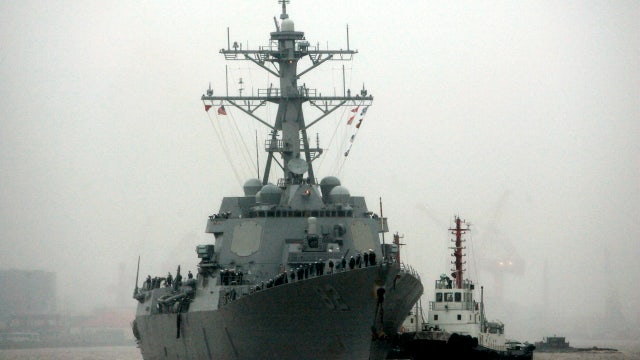Beijing steps up offensive in South China Sea
Defcon 3: Rodger Baker and Dean Cheng on China's game plan in the disputed waters
Secretary of Defense Ash Carter on Saturday slammed Russia, saying it is endangering the world order through its incursions in Ukraine and loose talk about nuclear weapons, and said the U.S. defense establishment is searching for ways to deter Russian aggression to protect U.S. allies.
Carter, speaking to the Reagan National Defense Forum in California, also expressed concern about China’s expanding influence and growing military might. National security experts and defense officials attended a gathering at the Ronald Reagan Presidential Library.
Carter said Russia is undertaking "challenging activities" at sea, in the air, in space and in cyberspace.
"Most disturbing, Moscow's nuclear saber-rattling raises questions about Russian leaders' commitment to strategic stability, their respect for norms against the use of nuclear weapons, and whether they respect the profound caution nuclear-age leaders showed with regard to the brandishing of nuclear weapons," he said.
His remarks were perhaps the strongest he has expressed about America's former Cold War foe.
"We do not seek a cold, let alone a hot, war with Russia," he said. "We do not seek to make Russia an enemy. But make no mistake; the United States will defend our interests, our allies, the principled international order, and the positive future it affords us all."
Carter’s comments come as Russia begins to assert itself in the war against the Islamic State in Syria and as China tries to assert its dominance off its own shores.
Carter, returning from eight days of travel in Asia, cited several pillars of the international order that he argued should be defended and strengthened: peaceful resolution of disputes, freedom from coercion, respect for state sovereignty, and freedom of navigation.
"Some actors appear intent on eroding these principles and undercutting the international order that helps enforce them," he said. "Terror elements like ISIL, of course, stand entirely opposed to our values. But other challenges are more complicated, and given their size and capabilities, potentially more damaging."
"Of course, neither Russia nor China can overturn that order," he said. "But both present different challenges for it."
Carter also accused Russia of stirring the pot in the Middle East.
"In Europe, Russia has been violating sovereignty in Ukraine and Georgia and actively trying to intimidate the Baltic states," he said. "Meanwhile, in Syria, Russia is throwing gasoline on an already dangerous fire, prolonging a civil war that fuels the very extremism Russia claims to oppose."
Carter made clear that Russia is at the forefront of Washington's concern about evolving security threats.
"We are adapting our operational posture and contingency plans as we - on our own and with allies - work to deter Russia's aggression, and to help reduce the vulnerability of allies and partners," he said.
Vladimir Putin is challenging the U.S. in other areas other than Syria. Russia last year said it was reopening 10 former Soviet-era military bases along the Arctic seaboard that were closed after the Cold War ended in 1991. Russia is also flying more long-range air patrols off American shores.
Carter left open the possibility that Russia's role in Syria could evolve into one the U.S. can embrace.
"It is possible -- we'll see -- Russia may play a constructive role in resolving the civil war," he said.
Carder said China is the most influential player in Asia’s future, and he noted that earlier this week aboard an American vessel in the South China Sea to demonstrate U.S. commitment to freedom of navigation.
Carter remained committed to more sea patrols in the South China Sea to even further demonstrate freedom of navigation, according to Reuters. The U.S. guided-missile destroyer, the USS Lassen came within China’s 12-nautical-mile zone around the Spratly archipelago.
China has built multiple artificial islands in the South China Sea and claimed sovereignty over them, despite multiple other Asian countries claiming territory in the same areas.
"As a rising power, it's to be expected that China will have growing ambitions and a modernizing military," he said. "But how China behaves will be the true test of its commitment to peace and security."
He said the U.S. has been shifting its focus toward the Asia-Pacific, including sending its best naval and other military weapons, ships and equipment to that region.
"We are also changing fundamentally our operational plans and approaches to deter aggression, fulfill our statutory obligations to Taiwan, defend allies, and prepare for a wider range of contingencies in the region than we have traditionally," he said.
The Associated Press contributed to this report.











































